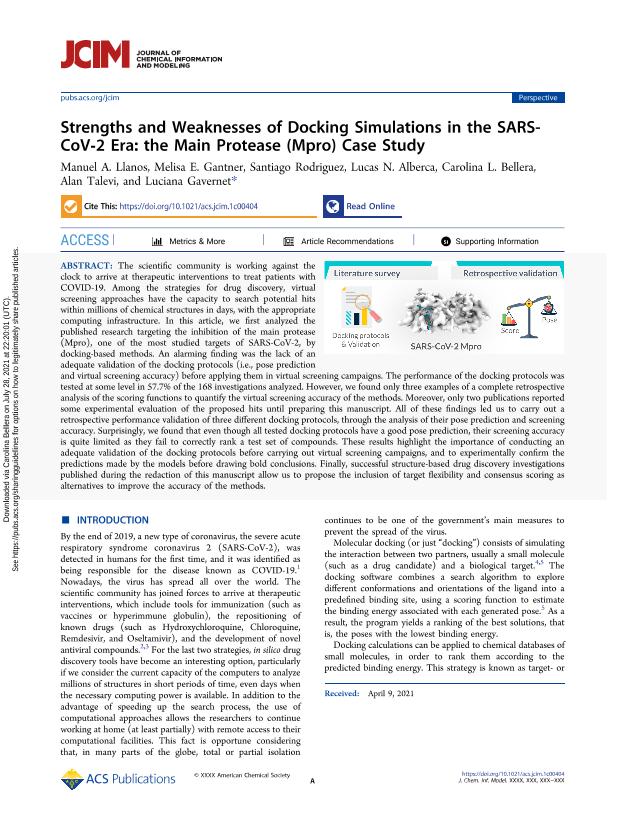Mostrar el registro sencillo del ítem
dc.contributor.author
Llanos, Manuel

dc.contributor.author
Gantner, Melisa Edith

dc.contributor.author
Rodríguez, Santiago

dc.contributor.author
Alberca, Lucas Nicolás

dc.contributor.author
Bellera, Carolina Leticia

dc.contributor.author
Talevi, Alan

dc.contributor.author
Gavernet, Luciana

dc.date.available
2022-01-07T15:30:34Z
dc.date.issued
2021-07
dc.identifier.citation
Llanos, Manuel; Gantner, Melisa Edith; Rodríguez, Santiago; Alberca, Lucas Nicolás; Bellera, Carolina Leticia; et al.; Strengths and Weaknesses of Docking Simulations in the SARS-CoV-2 Era: The Main Protease (Mpro) Case Study; American Chemical Society; Journal of Chemical Information and Modeling; 61; 8; 7-2021; 3758-3770
dc.identifier.issn
1549-9596
dc.identifier.uri
http://hdl.handle.net/11336/149785
dc.description.abstract
The scientific community is working against the clock to arrive at therapeutic interventions to treat patients with COVID-19. Among the strategies for drug discovery, virtual screening approaches have the capacity to search potential hits within millions of chemical structures in days, with the appropriate computing infrastructure. In this article, we first analyzed the published research targeting the inhibition of the main protease (Mpro), one of the most studied targets of SARS-CoV-2, by docking-based methods. An alarming finding was the lack of an adequate validation of the docking protocols (i.e., pose prediction and virtual screening accuracy) before applying them in virtual screening campaigns. The performance of the docking protocols was tested at some level in 57.7% of the 168 investigations analyzed. However, we found only three examples of a complete retrospective analysis of the scoring functions to quantify the virtual screening accuracy of the methods. Moreover, only two publications reported some experimental evaluation of the proposed hits until preparing this manuscript. All of these findings led us to carry out a retrospective performance validation of three different docking protocols, through the analysis of their pose prediction and screening accuracy. Surprisingly, we found that even though all tested docking protocols have a good pose prediction, their screening accuracy is quite limited as they fail to correctly rank a test set of compounds. These results highlight the importance of conducting an adequate validation of the docking protocols before carrying out virtual screening campaigns, and to experimentally confirm the predictions made by the models before drawing bold conclusions. Finally, successful structure-based drug discovery investigations published during the redaction of this manuscript allow us to propose the inclusion of target flexibility and consensus scoring as alternatives to improve the accuracy of the methods.
dc.format
application/pdf
dc.language.iso
eng
dc.publisher
American Chemical Society

dc.rights
info:eu-repo/semantics/openAccess
dc.rights.uri
https://creativecommons.org/licenses/by-nc-sa/2.5/ar/
dc.subject
Docking
dc.subject
MPro
dc.subject
COVID-19
dc.subject
Virtual screening
dc.subject.classification
Métodos de Investigación en Bioquímica

dc.subject.classification
Ciencias Biológicas

dc.subject.classification
CIENCIAS NATURALES Y EXACTAS

dc.title
Strengths and Weaknesses of Docking Simulations in the SARS-CoV-2 Era: The Main Protease (Mpro) Case Study
dc.type
info:eu-repo/semantics/article
dc.type
info:ar-repo/semantics/artículo
dc.type
info:eu-repo/semantics/publishedVersion
dc.date.updated
2021-12-13T18:50:59Z
dc.journal.volume
61
dc.journal.number
8
dc.journal.pagination
3758-3770
dc.journal.pais
Estados Unidos

dc.description.fil
Fil: Llanos, Manuel. Universidad Nacional de La Plata. Facultad de Ciencas Exactas. Laboratorio de Investigación y Desarrollo de Bioactivos; Argentina. Consejo Nacional de Investigaciones Científicas y Técnicas. Centro Científico Tecnológico Conicet - La Plata; Argentina
dc.description.fil
Fil: Gantner, Melisa Edith. Universidad Nacional de La Plata. Facultad de Ciencas Exactas. Laboratorio de Investigación y Desarrollo de Bioactivos; Argentina. Consejo Nacional de Investigaciones Científicas y Técnicas. Centro Científico Tecnológico Conicet - La Plata; Argentina
dc.description.fil
Fil: Rodríguez, Santiago. Universidad Nacional de La Plata. Facultad de Ciencas Exactas. Laboratorio de Investigación y Desarrollo de Bioactivos; Argentina. Consejo Nacional de Investigaciones Científicas y Técnicas. Centro Científico Tecnológico Conicet - La Plata. Instituto de Investigaciones Bioquímicas de La Plata "Prof. Dr. Rodolfo R. Brenner". Universidad Nacional de la Plata. Facultad de Ciencias Médicas. Instituto de Investigaciones Bioquímicas de La Plata "Prof. Dr. Rodolfo R. Brenner"; Argentina
dc.description.fil
Fil: Alberca, Lucas Nicolás. Consejo Nacional de Investigaciones Científicas y Técnicas. Instituto de Investigaciones en Ingeniería Genética y Biología Molecular "Dr. Héctor N. Torres"; Argentina
dc.description.fil
Fil: Bellera, Carolina Leticia. Universidad Nacional de La Plata. Facultad de Ciencas Exactas. Laboratorio de Investigación y Desarrollo de Bioactivos; Argentina. Consejo Nacional de Investigaciones Científicas y Técnicas. Centro Científico Tecnológico Conicet - La Plata; Argentina
dc.description.fil
Fil: Talevi, Alan. Universidad Nacional de La Plata. Facultad de Ciencas Exactas. Laboratorio de Investigación y Desarrollo de Bioactivos; Argentina. Consejo Nacional de Investigaciones Científicas y Técnicas. Centro Científico Tecnológico Conicet - La Plata; Argentina
dc.description.fil
Fil: Gavernet, Luciana. Universidad Nacional de La Plata. Facultad de Ciencas Exactas. Laboratorio de Investigación y Desarrollo de Bioactivos; Argentina. Consejo Nacional de Investigaciones Científicas y Técnicas. Centro Científico Tecnológico Conicet - La Plata; Argentina
dc.journal.title
Journal of Chemical Information and Modeling

dc.relation.alternativeid
info:eu-repo/semantics/altIdentifier/url/https://pubs.acs.org/doi/10.1021/acs.jcim.1c00404
dc.relation.alternativeid
info:eu-repo/semantics/altIdentifier/doi/http://dx.doi.org/10.1021/acs.jcim.1c00404
Archivos asociados
